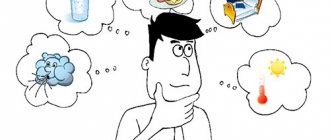We all come from childhood. We all, to varying degrees, experience the need for acceptance and approval of me for who I am. Satisfying this need supports us, helps us feel strength, self-confidence, independence, and integrity. Helps build relationships with people without demands, claims, deception, manipulation, jealousy and violence. Helps to be sincere, responsive, caring, understanding, forgiving and accepting. Capable of loving, feeling themselves and others, taking into account their own and other people's needs.
We all come from childhood, and everyone’s childhood is different. Everyone has their own story; someone found their childhood in war, famine, poverty. Some had no parents, or had one parent, and some grew up and were brought up in a complete family. There are those who grew up in material prosperity, those in poverty, or in the middle class. These, and many other factors, affect the physical and psychological health of the child. But the most important need for a child has always been parental love, acceptance, recognition and approval.
Just as satisfying physiological needs is important for a child, satisfying emotional hunger is no less important.
A child under 5 years old perceives information mainly non-verbally, peering into the eyes of his parents, as indicators of what kind of person I am (the child). The child passes any action of the parents through the prism: I am good, or I am bad! Nothing goes unnoticed. This is how the child’s personality and his future destiny are formed.
Through the prism of relationships towards oneself, one’s attitude towards people around us and the whole world is formed. Anyone who has not fully satisfied his need for love, recognition and approval is himself not adequately able to love, approve, support and accept another person. Almost all a person’s feelings are “umbrella”, i.e., what I feel for myself is what I feel for others, and vice versa.
How a child’s self-image develops can be seen from an example: the father left the family, the child does not perceive this as the fact that the father has another woman, and he already has his own life, but perceives it as I (the child) am bad, and It was my father who left me. Or, you can often see how a parent with “good” intentions raises a child through punishment and physical violence. The child perceives this message for himself as: “I hit you because I love you.” Or the mother went to the store and left the little child alone at home. The child gets hysterical because he perceives his mother’s action as rejection (I’m bad).
The fear of rejection and the need for recognition encourage the child to be more resourceful and dexterous in order to receive attention, love, and approval. As a way of “survival,” the child plays typical games and roles, puts on “masks,” all in order to receive attention and recognition from his parents. Only over the years, these roles do not disappear anywhere, since the way of relating to people remains fixed.
Role/mask 1. Child hero.
Such a child always succeeds everywhere. He is such a correct, obedient child. He takes an active part in school Olympiads, exhibitions, competitions, and, of course, is a good student. Everything he does is done in order to satisfy the need for love and recognition. His whole being seems to say: “look how good I am”!
In adult life, such a person sets unrealistic goals for himself, high goals in order to assert himself. I noticed that such people do not have a feeling of satisfaction after the goal is achieved. They tend to look for mistakes in themselves, in their actions. This depresses them themselves, but they cannot do otherwise.
They are very touchy (angry at themselves), shy, guilty, afraid (nothing will work out), and low self-esteem. The fear of making a mistake, of doing everything perfectly, sometimes leads them into an emotional stupor. Psychologist Vyacheslav Gusev, in one of his books, described a plot in which his daughter in the first grade, in a notebook, tried to write even sticks. She couldn’t write straight sticks, and the fear of making mistakes (you can’t make mistakes) prompted her to inaction. Then her father told her to write whatever sticks she could make. After a number of “mistakes,” my daughter was able to write straight sticks. Such people grow up to be a workaholic, always right and self-centered. In marriage, he is a subordinate, as he tries to gain recognition through the right actions. Needs control and manipulation, is suggestible. It is difficult for such a person to say NO, because he fears that by saying NO, he will reject the other person, and such rejection will be followed by rejection of himself.
A little about the main thing
Love is that cherished feeling that all people want to experience in their lives. Every person, regardless of age and gender, would like to receive warmth and tenderness from others. For some, the love of loved ones is enough, for others, they need to be loved by everyone. But you can’t be good to everyone. Almost no one likes bad people except those close to them.
Experts believe that the need for universal love is a serious psychological problem that needs to be combated. It is possible that a person underestimates himself, and therefore he tries to be very good for everyone, so that others will love him.
Role/mask 2. Scapegoat.
There is a parable about the scapegoat, which says that the priest of a village took a goat and blamed all the sins of that village on it. Then they took the goat into the desert, where it slowly died of thirst, as if through its suffering it cleansed the village of sin.
In a family, such a child is burdened with a lot of guilt and responsibility. You may find that the child, who, however, was not expected in this world, is to blame for all the troubles in the family. Then, in different ways, the parents take it out on the grief-stricken child for their failed life - “if it weren’t for you, then I...”!
Often, in order to achieve their failed goals in life, parents “out of good intentions” use the child without taking into account his interests. There are a limitless number of examples that can be given. The main slogan of such parents is: “I’m trying for you,” “I know better what’s good for you.” In any case, the child fulfills his role as a “scapegoat” for his parents.
“I don’t suffer for myself” is the slogan of such a child. Such a child is very hostile and does not obey his elders. By type of character, he is touchy, gloomy, angry, and has very low self-esteem. In order to receive surrogate recognition, love, approval, he attracts attention through negative behavior. He can easily break glass at school with a stone, and all in order to attract the attention of teachers, parents, and peers. Since people pay attention to it, it means it is significant.
The metaphor is that the pendulum doesn’t really care which side you swing it from.
Need for love
Dante stated: “Love is the force that moves the world, and if we fail to satisfy our need for love, everything in our life suffers.” The Slavic word “love” comes from the Old Slavonic “shlyub”, which literally means “union, union, unity, agreement.” Echoes of this semantic meaning of love have been preserved to this day in some Slavic languages. That is, love is the mystical union of a man and a woman into a single whole. Connection of destinies, bioenergies, psycho-emotional sphere. Thus, a qualitatively new entity appears.
The desire to find and fulfill that very true love is inherent in the very essence of man. This need is characteristic of every person from early childhood. Its normal development is expressed in the ability to reciprocate love. From the cradle to the end of our lives, we are all looking for someone who will love us and whom we could love. And indeed, love is simply necessary, it is vital. Without it, we lose the will to live, our mental abilities and physical energy weaken, resistance falls, and the meaning of what we do and why we live disappears. An unquenched thirst for human affection will not give us peace. And the more we try to close ourselves off from it, the harder our life becomes. And in the later life of every person there are moments of closeness and unity with others that fuel his aspiration for others. In moments of intimacy, a person experiences a completely special state - when time suddenly disappears, and everything temporary suddenly disappears, and eternity seems to touch the soul. A person comes out here from the entire chain of space and time, from all his connections with the world. Only one blinding sensation remains in him, which leaves a brighter trace than millions of his thoughts, concepts, habits, feelings, memories.
Despite the fact that love brings not only the greatest satisfaction, but sometimes the most bitter sadness, nevertheless, men and women do not cease to desire love. When love disappears, marriages fall apart, the personality enters into mortal combat with emptiness, and terrible hopelessness engulfs former spouses and those around them. The consequences of such emotional breakdowns are childhood and adult crime, suicide, alcoholism and various forms of drug addiction. Existence is incomplete and unstable if it does not carry within itself a desire for something beyond its boundaries. Love is a connection between people . Where such a connection appears, the life of an individual person outgrows the framework of his own, finite, limited existence. Living among people, a person learns to love, understanding with his whole being not only the necessity and inevitability of another person, but also the deep meaningfulness and grace of this fact: the existence of another person.
We all crave love, and the need for it is limitless; sometimes it seems like we will never get enough. In essence, love is the only thing on which our well-being depends. Under the influence of its life-giving power, we are able to survive the most bitter moments of life, endure insults and cruelty. However, we must be realistic in our desires, because it is unlikely that we will always be loved to the extent that we would like. If someone hopes for ardent love for the rest of his life, he wants the impossible from human nature.
“Not to be loved is just failure, not to love is misfortune.” A. Camus.
The need to fall in love and to fall in love is born from intense expectation (“The soul was waiting for someone!”), and the beloved himself is only a reason for these feelings to fall on him. Therefore, for a person who knows how to love, there will be no problem with choosing a worthy partner. Only a person who is not closed to himself in his deepest aspirations, who knows how to give love, will be able to truly appreciate and preserve this gift (the ability to love another), revealing and affirming its high meaning, while a closed person begins with a distortion of the meaning given to him, and That’s why he comes to the conclusion that life is meaningless
Because love is not the desire to receive something in exchange for one’s own feelings. This is the desire to give of oneself. If you want your marriage to be filled with deeper love, start by loving more deeply yourself. Instead of expecting your partner to show you love, think about what your spouse's needs are and start living them from today, from now on! Trying to express in one word what both gives meaning to life and constitutes its innermost meaning, Tolstoy always said the same thing: love as the source of a person’s moral connection with the world and the people around him.
Love also has the greatest value due to the fact that it is one of the most powerful sources of positive emotions, pleasure and joy. And the importance of positive emotions is difficult to overestimate. They encourage, mobilize and, on the other hand, soften the impact of life's trials. Love is a human activity, and any activity can be learned and creatively improved in it, this is given by the accumulation of one’s experience, assimilation of the experience of mankind, knowledge, research, trial and error, experimentation, daring. Creative people usually do not wait for inspiration, but set themselves up and bring themselves to this state. For example, P.I. Tchaikovsky believed that “inspiration cannot be expected, and it alone is not enough: you need work, work, and work”!).
Parental relationships greatly influence the ability to love. Every person wants to love and be loved, to have a happy family. But there are certain unconscious mechanisms laid down in childhood that greatly influence the perception of the world around us. Thus, a child who was not loved by his parents always considers himself unworthy of love, and it does not occur to him that his parents may have a defect in the ability to love.
It is difficult to dispute that many of society’s ills are rooted in negative factors generated by marital conflicts and family breakdown. We, without noticing it ourselves, learn to be a husband or wife from our parents, from early childhood adopting their behavior patterns and relationship stereotypes. In our adult lives, we continue to live according to these “parental instructions”, without realizing them and rarely noticing their manifestations. From our parents' relationships with each other, we learn how to relate to the person next to us. James McHale, a professor of clinical psychology at Clark University, says, "The best children are those who feel their parents' warmth not only toward them, but toward each other."
The child perceives and adopts not what the parents try to instill in him during the “moments of upbringing,” but their attitude towards people, towards themselves, towards life, and a subconscious attitude at that. If a grown-up person then believes (due to his negative past experience) that love does not exist, then it will not exist in this person’s life. If he believes that it is impossible to be happy in such a world, then he will be unhappy (until he reconsiders his views). No wonder they say: if you want to be happy, be happy. A person’s love and self-respect cannot simply appear out of nowhere. Just as a child cannot speak if he does not hear the speech of other people, he will not learn to love - neither himself nor others, if he himself is not loved, if on his life’s path he does not meet people who are capable of giving human warmth.
Human society, despite thousands of years of cultural development, has not learned to guarantee the psychological well-being of each of its members. And this well-being depends on the psychological climate of the environment in which he grows, lives and works. And also from the emotional baggage accumulated in childhood. And the psychological climate in the family depends on the ability of the parents themselves to give love and human warmth to each other and to their children, and depends on the style of communication between the parents and the child. The need for receptive and supportive communication, touch, and other signs of attention and love can be unmet and lead to suffering and destructive emotions.
“The general law here is simple: in childhood, we learn about ourselves only from the words and attitude of those close to us . In this sense, a small child does not have inner vision. His image is built from the outside; sooner or later he begins to see himself as others see him, says Russian psychology professor Yulia Gippenreiter. “However, in this process the child does not remain passive. Another law of all living things applies here: actively pursue what survival depends on. A positive attitude towards oneself is the basis of psychological survival, and the child constantly seeks it and even fights for it. He is waiting for confirmation from us that he is good, that he is loved, that he can cope with feasible (and even slightly more difficult) tasks.”
Despite the difference in initial conditions given at birth, upbringing and education, any person has every chance to fulfill his human destiny. Everyone has their own. And the measure of happiness depends most strongly on the fulfillment of what is planned (by whom? - fate, God, the universe - whatever you want) about a given person. Loving your children in such a way as to teach them to love the world is a very difficult task, but this is precisely the main purpose of parents in relation to their children. Only under the condition of good-quality parental love can one help a child assimilate all the previous experience of people living on Earth, without stifling the creative potential of the new person.
Role/mask 3. Lost child.
In order for a child to form a “lost child” mask, it is quite enough for the parents to address the child: “you are so great, you can’t be seen, you can’t be heard, there are no problems or worries with you.” All said and done. The child understands this as: “I am loved because I cannot be seen or heard.” Such a child seems to be lost from sight of his parents, he is a “lost” child.
Another reason for the appearance of such a role is that parents pay little attention to the child. There is no need to talk about parental love at all. Such a child finds solace by withdrawing into himself, often alone with things and toys. The need for love, recognition and acceptance is fulfilled in fantasies.
Such people are lonely. In appearance they are calm, dreamy and shy. Inside they experience pain, abandonment, resentment, loneliness and anxiety. They need relationships with people, but are afraid to start them because they are afraid of rejection. It's hard for them to say NO to another person. You can hear from them: “when I am alone, there is no one to reject me.”
For such a person, life is boring and uninteresting. He is not picky in his relationships with people, one might even say that no matter how they notice people (they reject them). It’s not that they do this consciously, they just don’t have any other experience than rejection. If they have to be in a relationship, then this relationship is superficial.
The need to give and the need to receive
Our relationship needs can be roughly divided into:
- The need to “give” to another.
- The need to “receive” from another.
That is, we all need not only to receive something from other people (warmth, protection, support, care, sympathy, help), but also to do something for others ourselves (help them, show care, support, hug, say kind words).
In order for us to feel happy and satisfied in a relationship, both of these aspects are important. So that in a relationship we can both receive something from our partner and give it to him.
And no matter how strange it may seem, not in all relationships there is an opportunity to freely give and freely receive.
Some people do not know how to accept and internally “assimilate” what their partner gives them - support, care, attention, warm touches, gifts, help, recognition, pleasant words, etc.
And when their partner tries to do something for them, instead of joy and gratitude, they experience severe awkwardness, irritation, mistrust, a desire to push him away, bewilderment, etc.
This happens when a person is not used to receiving it. When he grew up in a family where he was not given this. Or when he was severely traumatized by something that for him is associatively connected with these actions. For example, his parents gave him attention, but they did it through shouting and swearing. Or he was given warmth and support, and then betrayed. Or they hugged him and then started harassing him.
And then, unconsciously, a person associates some pleasures with pain. That is, associations are formed in his psyche that attention = violence, support = betrayal, hugs and touches = sexual violence.
And then, when he reacts negatively to pleasant things, he actually reacts not to them, but to what these pleasant things are associated with on an unconscious level.
It also happens when people do not know how, on the contrary, to “give.” They do not know how to support another person, care, hug, help, pay attention, give gifts, give recognition, say nice words, etc.
This may be due to the fact that it was not customary to do this in the person’s family. When he himself did not receive this from his parents, and therefore did not learn. Or if his parents didn’t know how to “accept” when he tried to do something nice for them. And then the person learned to behave coldly and indifferently in order to protect himself from repeated rejection of his care.
The inability to “give” can be manifested quite strongly, and then a person may very rarely do anything for other people and may give the impression of a cold and inaccessible person.
Or the inability may extend to some specific actions - for example, a person may not be able to provide support, but at the same time be able to give gifts.
It’s the same with the inability to accept. It can concern many things, and then it is generally difficult for a person to be in a relationship where he is not rejected. Or it can be narrower, when a person does not know how to accept and internally assimilate some specific things - for example, he does not know how to accept support, or gifts, or care.
Role/mask 4. Jester. Family clown.
Such a child takes responsibility for the feelings and states of other people. He has this idea that if someone is in a sad mood, then it is his responsibility. Then, he tries to somehow cheer up the other person, to console him with jokes. It happens that such a person is responsible for all his relatives, friends and relatives. With this sometimes unbearable burden, he lives a life that is not his own, forgetting about his desires and needs.
In life, the “family clown” has low self-esteem. Experiences loneliness, pain, fear, anxiety and uncertainty. Compensates for the need for love, recognition, approval with his “clown” behavior, wanting to show and find his NEED for another person.
He is unable to cope with his stress because he has a taboo on expressing negative feelings. And the one who does not show feelings suppresses them.
What is love?
This is perhaps the most difficult word in the world to explain. Of course, each person puts his own spin on this concept, but what is love for the majority? The word “love” is literally crammed into our lives: books, movies, surroundings, past, present, future... it sounds and is used everywhere, in various situations. We can love animals, books, women's films, ice skating and immediately love our mother, children, parents. We can also love objects: food, car, house; nature: sun, rain, wind.
How many meanings one word has, and how much meaning is put into it. We sometimes even explain our behavior as “I did it because I love him.” It is convenient to explain any of your actions.
How to win the love of loved ones
Imagine a situation: a 6-year-old girl actively attracts the attention of her parents: she talks something about her day in kindergarten, about her friends, asks to tell a fairy tale or involve one of her parents in playing with dolls. But parents get irritated and consider the child clingy and annoying
And they may even be embarrassed by him in front of strangers. Gradually the girl understands: they won’t love her just like that.
The girl unconsciously understands: if she does not demand attention, but shows attention herself, then she can receive it in return. Therefore, when she urgently needed the attention of dad or mom, she was interested in their affairs, or volunteered to help with something
If the parent was reading, she would come up and ask what he was reading. He began to tell her, he was pleased with her interest. Being close to her parent, feeling his bestowal, she felt his fatherly feelings towards her.
She could help her mother put away the dishes or fold clothes. So she felt that she was needed, that she was loved.
Growing up, the girl replaces her true feelings and emotions with attention to the needs of others. Satisfying the needs of others, giving them care, she felt needed by them
But at the same time, when she herself unconsciously needed attention, and instead of sincerely expressing her desire, she habitually began to give attention to others, irritation grew in her. After all, in essence, she crushed her own desires, sometimes replacing them with unnecessary care for others.
Between two people
Very often from many women you can hear the following phrase: “I want to be loved.” What does a representative of the fair sex mean by her words? Of course, we are talking here about the relationship between two people - a man and a woman.
Girls want to hear pleasant words from their lover, experience tenderness from his touch, and receive a lot of warmth and care. For most women, this is the love of a man. However, in a relationship, only one person cannot love. Because true love means working on the relationship. Accordingly, each partner should not only receive warmth and tenderness from the other, but also give it in return. If this does not happen, then the union is gradually destroyed.
Thus, people must learn not only to receive, but also to give love. If in a relationship only the woman experiences feelings, and the man only takes advantage of this, then over time the girl may develop psychological dependence on her partner and the fear of losing him. As a result, the union is destroyed.
Help around the house, give her some time for herself
Everyone wants help at home, if not with everything, but at least with the little things. It’s so nice to have a man nearby who knows how to cook or raise children.
If you can’t or don’t want to help yourself, hire cleaners, buy equipment, or give the woman money so she can figure out what to buy and who to hire.
A woman, like a man, should have time for herself. She can go to the doctor, to the salon, lie in the bath, read a book. There is no need to pull it when it’s time to weed the garden or wash the dishes. She may wash it, but she won’t love you more for it.
If you don’t like going shopping with her, don’t go, but carry heavy bags yourself, or give her money for a taxi. A woman should not resemble a mule or a cab driver, especially when carrying food for lunch.
The emotions experienced stem from the type of thinking
Psychologists say that the emotions a person experiences and the psychological needs he feels directly depend on the type of thinking. In other words, the beliefs and principles that guide people in life are formed in the head. And it is on them that a person’s behavior and the emotional needs he experiences depend.
According to psychologists, a person’s type of thinking is formed in childhood, but is adjusted throughout life. In other words, if in childhood and adolescence a person desperately tried to earn approval and love from others, and in his youth he sought to achieve recognition in some area, this does not mean at all that in adulthood he will begin to experience similar emotional needs. Human thinking is flexible and can change under the influence of circumstances, information, and personal life experience.
Accordingly, the felt need for approval and love may well be replaced by self-sufficiency, self-confidence and other emotional states.











